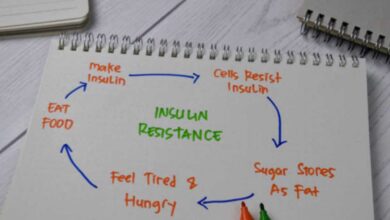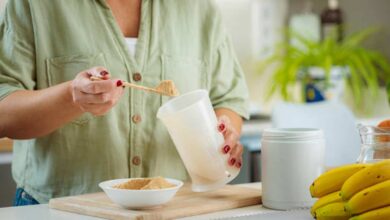 Diabetes is a chronic condition that affects millions of people worldwide. While medication plays a crucial role in managing diabetes, making healthy lifestyle choices can also have a significant impact on blood sugar control.
Diabetes is a chronic condition that affects millions of people worldwide. While medication plays a crucial role in managing diabetes, making healthy lifestyle choices can also have a significant impact on blood sugar control.
In this article, we will explore natural ways to manage diabetes through dietary choices. By incorporating these tips into your daily routine, you can work toward achieving better blood sugar control and overall well-being.
1. Add Anti-Diabetes Foods to Your Diet
One of the first steps to managing diabetes naturally is to incorporate anti-diabetes foods into your diet. These foods, which include apple cider vinegar (ACV) and cinnamon, have been shown to help regulate blood sugar levels and can be easily included in your meals.
ACV is a pantry staple that has gained popularity for its potential to reduce blood sugar levels. It may work by delaying the emptying of your stomach after a meal, leading to a slower and more controlled rise in blood sugar. A convenient way to incorporate ACV into your diet is through ACV gummies, readily available both online and in stores.
Cinnamon is not just a delicious spice. It has been shown to enhance insulin sensitivity and slow down the breakdown of carbohydrates in the digestive tract. This means that after consuming a meal, your blood sugar levels may rise more gradually, preventing spikes.
See Also: 7+ Impressive Cucumber Juice Benefits For Your Health
2. Consume Foods With Chromium and Magnesium
Micronutrient deficiencies, such as low levels of chromium and magnesium, have been linked to high blood sugar levels and diabetes. Including foods rich in these minerals in your diet can be beneficial.
Chromium — found in foods like broccoli, whole grains, and lean meats — is involved in regulating blood sugar and insulin levels. Magnesium plays a crucial role in glucose metabolism and insulin sensitivity. You can find magnesium in foods like leafy greens, nuts, and whole grains.
By incorporating a variety of foods that provide these vital nutrients, you not only support your blood sugar management but also contribute to your overall well-being.
3. Eat Probiotic-Rich Foods
Probiotics are beneficial bacteria that offer various health benefits, such as improved blood sugar regulation. Including probiotic-rich foods in your diet can help maintain a healthy gut microbiome, which is linked to better blood sugar control.
Probiotic-rich foods that you might want in your diet include yogurt, kefir, sauerkraut, and kimchi. These fermented foods are teeming with probiotics that are great for your gut health. One thing to note, when choosing yogurt, choose plain, unsweetened options with live active cultures. This can help you watch your sugar intake because yogurt can deceivingly have a lot of sugar.
Choosing a variety of probiotic-rich foods can help diversify the types of beneficial bacteria in your gut, contributing to better overall health and blood sugar management.
4. Select Foods With a Low Glycemic Index
The glycemic index (GI) measures how quickly carbohydrates are digested and absorbed, affecting blood sugar levels. Foods with a low GI release sugar into the bloodstream gradually, helping to maintain stable blood sugar levels. This steady release helps prevent abrupt spikes and crashes in blood sugar levels, allowing for better blood sugar control.
By choosing foods with a lower GI, you are making a proactive choice to stabilize your blood sugar levels. You’ll reduce the risk of experiencing the fluctuations that can lead to complications associated with diabetes. This approach not only promotes better overall health but also empowers individuals with diabetes to manage their condition more effectively.
Opt for whole grains like oats, quinoa, and brown rice, which have a lower GI compared to refined grains. Beans, lentils, and chickpeas are also excellent choices due to their low GI and high fiber content. Other good choices include bulgur, barley, unsweetened Greek yogurt, and non-starchy vegetables.
5. Lower Your Sugar Intake
Excessive sugar consumption is strongly linked to an increased risk of type 2 diabetes. Reducing your sugar intake is a fundamental step in managing blood sugar levels.
High sugar consumption can disrupt the balance your body requires to maintain stable blood sugar levels. Sugary foods and beverages cause rapid blood sugar elevation, leading to a sudden release of insulin to counteract the surge. Over time, this continuous demand for increased insulin production can stress your pancreas and make it less effective in regulating your blood sugar. Lowering sugar intake eases this pressure on your body. It also minimizes the risk of diabetic complications, such as kidney disease, neuropathy, and cardiovascular issues.
Start by paying close attention to food labels, as sugar can hide under various names, such as sucrose, high-fructose corn syrup, and agave nectar. Also, limit sugary beverages like soda, fruit juices, and cocktails. These beverages should be consumed sparingly, if at all. Opt for water, herbal tea, or unsweetened beverages instead.
See Also: Molecular Hydrogen Against Oxidative Stress
Managing Your Diabetes
Managing diabetes naturally is not only possible but also highly beneficial for your overall health and well-being. By incorporating these five tips, you can take meaningful steps toward better blood sugar control.
Remember that this advice should complement your diabetes management plan and not replace medical advice. It’s essential to work closely with your healthcare team to develop a personalized approach that suits your specific needs. With dedication and a balanced lifestyle, you can take control of your diabetes and lead a healthier, more fulfilling life.







